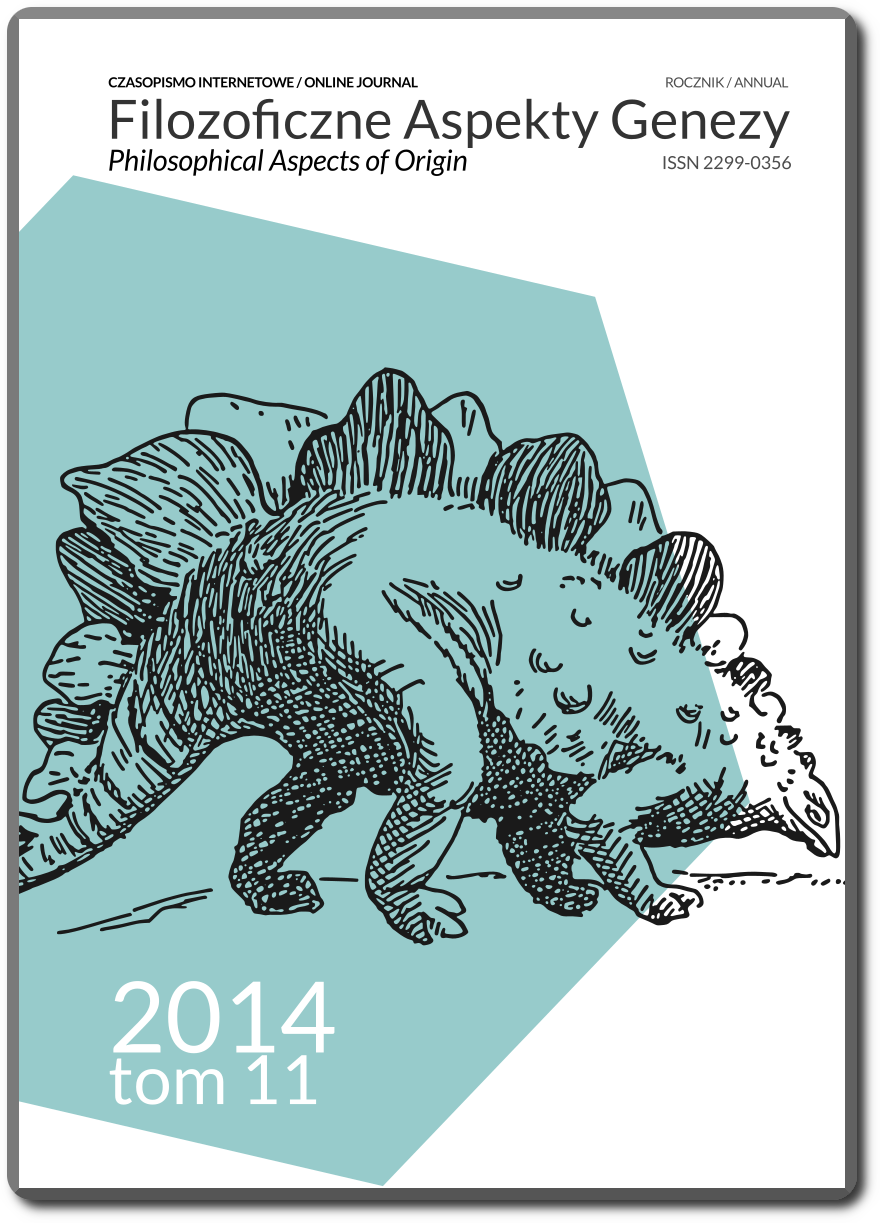Opublikowane 21.05.2021
Słowa kluczowe
- uniformitaryzm,
- naturalizm metodologiczny,
- naturalizm metafizyczny,
- teizm chrześcijański,
- boskie działanie opatrznościowe
- tomistyczna koncepcja przyczynowości wtórnej,
- okazjonalizm,
- teoria kwantów,
- transcendentna przyczynowość inteligentna,
- teoria inteligentnego projektu ...More

Utwór dostępny jest na licencji Creative Commons Uznanie autorstwa 4.0 Międzynarodowe.
Jak cytować
Abstrakt
Naukę uprawia się w zgodzie z założeniem niezawodnej regularności zjawisk świata fizycznego. Przyjmuje się, że świat ma strukturę przyczynową, którą można badać i rzetelnie poznać za pośrednictwem eksperymentów, obserwacji i hipotez naukowych. Co do tego nie ma wątpliwości. Pozostaje jednak problem uzasadnienia — zasadniczego dla heurystycznej użyteczności nauki — metafizycznego i metodologicznego założenia, że przyroda jest jednostajna, dzięki czemu teraźniejszość może być kluczem do przeszłości i przyszłości. W niniejszym artykule główną uwagę poświęca się metafizycznej podstawie i uzasadnieniu przyjętych w uniformitaryzmie założeń dotyczących przyrody oraz wykazaniu, że są one niezgodne tak z metafizyczną, jak i metodologiczną odmianą naturalizmu.
Downloads
Bibliografia
- Plantinga Alvin, Where the Conflict Really Lies: Science, Religion, and Naturalism, Oxford University Press, New York 2011.
- Bishop Robert, „God and Methodological Naturalism in the Scientific Revolution and Beyond”, Perspectives on Science and Christian Faith 2013, vol. 65, no. 1, s. 10-23.
- Ratzsch Del, The Battle of Beginnings: Why Neither Side Is Winning the Creation-Evolution Debate, InterVarsity Press, Downers Grove, Illinois 1996.
- Murphy Nancey, „Phillip Johnson on Trial: A Critique of His Critique of Darwin”, Perspectives on Science and Christian Faith 1993, vol. 45, no. 1, s. 26-36.
- Haarsma Loren, „Christianity as a Foundation for Science”, http://www.asa3.org/ASA/education/origins/mn-lh.htm.
- Gordon Bruce L., „A Quantum-Theoretic Argument against Naturalism”, w: Bruce L. Gordon and William A. Dembski (eds.), The Nature of Nature: Examining the Role of Naturalism in Science, ISI Books, Wilmington, Delaware 2011, s. 179-214.
- The Works of the Honourable Robert Boyle, 5 volumes, vol. 1, London 1744.
- Hannam James, The Genesis of Science: How the Christian Middle Ages Launched the Scientific Revolution, Regnery, Washington, DC. 2011.
- Meyer Stephen C.R, Of Clues and Causes: A Methodological Interpretation of Origin of Life Studies, rozprawa doktorska, Cambridge University 1990.
- Meyer Stephen C. , Signature in the Cell: DNA and the Evidence for Intelligent Design, HarperOne, San Francisco, California 2009.
- Marks Robert J. II, Behe Michael J., Dembski William A., Sanfrord John C., and Gordon Bruce L.(eds.), Biological Information: New Perspectives, World Scientific, New Jersey — London — Singapore — Beijing — Shanghai — Hong Kong — Taipei — Chennai 2013.
- Meyer Stephen C., „DNA, Darwin i wrażenie projektu”, przeł. Małgorzata Gazda, Problemy Genezy 2012, t. XX, s. 175-195.
- Meyer Stephen C., „Ewolucja tajemnicy”, przeł. Małgorzata Gazda, Problemy Genezy 2012, t. XX, s. 196-220.
- Meyer Stephen C., „Podwójna helisa”, przeł. Małgorzata Gazda, Problemy Genezy 2012, t. XX, s. 221-244.
- Meyer Stephen C., „Podpis w komórce”, przeł. Małgorzata Gazda, Problemy Genezy 2012, t. XX, s. 245-268.
- Meyer Stephen C., „Molekularny labirynt”, przeł. Małgorzata Gazda, Problemy Genezy 2012, t. XX, s. 269-290.
- Lloyd Seth, „Computational Capacity of the Universe”, Physical Review Letters 2002, vol. 88, http://arxiv.org/pdf/quant-ph/0110141v1.pdf, doi:10.1103/PhysRevLett.88.237901.
- Wolterstorff Nicholas, Reason within the Bounds of Religion, 2nd ed., William B. Eerdmans, Grand Rapids, Michigan 1984.



